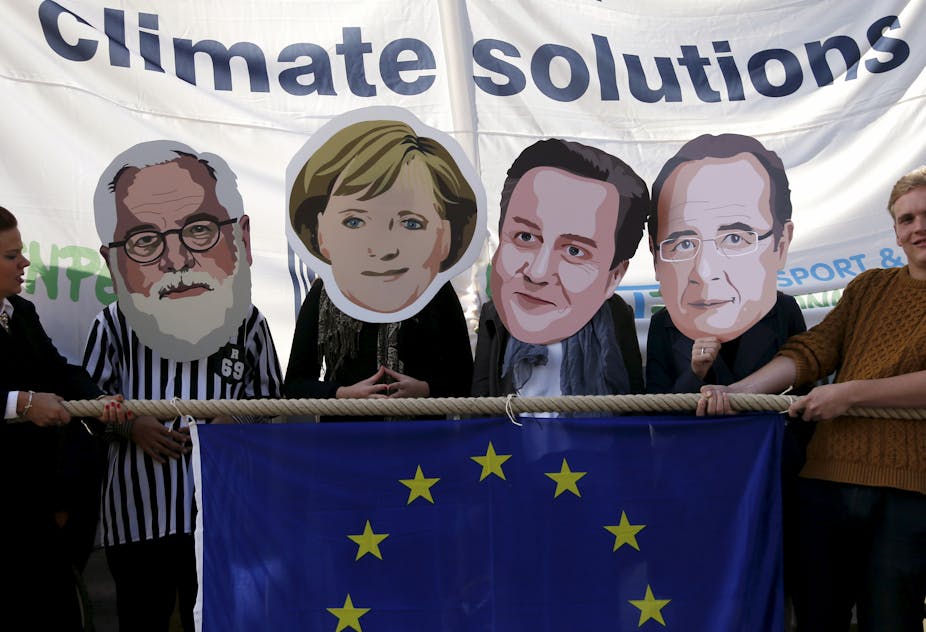Paris gives the EU an opportunity to make up for its quiet performance in Copenhagen six years ago, but myriad distractions and a lack of early ambition so far suggest it will settle for facilitating, rather than driving, a serious climate deal.
Every country wants to have a clear international identity. And a good one at that. For the past 15 years, the European Union (EU) has wanted others to see it as an environmental pioneer, particularly regarding climate change. But at the Copenhagen talks in 2009 the EU ended up being quietly ignored while the US and China dominated. The Paris climate talks therefore represent a significant challenge.
On the one hand, climate change mitigation policy is one of the EU’s favourite topics – and the conference is taking place on home turf, in France. If the EU can find its voice on any issue in the coming 12 months, it is at Paris.
On the other hand, Europe is enduring a lingering eurozone crisis, failing to handle the large numbers of Syrian refugees on its doorstep and must acknowledge that other states, such as the US, China and India, are now more important to combating climate change. The recent Volkswagen crisis has also raised eyebrows at the EU’s much-vaunted leadership status.

The EU’s Intended Nationally Determined Contribution (INDC) – in non-UN language: “target” – is a commitment to reducing greenhouse gases by 40% by 2030 compared to 1990 levels. This target represents one of the biggest reductions goals submitted so far.
So why are green groups unhappy with the EU’s goal?
The first thing to point out is European countries have been churning out greenhouse gases longer than anywhere else and their economies have benefited as a result. If anywhere has the biggest responsibility to make emissions cuts, it’s Europe. But the EU’s target is unlikely to keep temperature rises below 1.5°C; the threshold suggested by the Intergovernmental Panel on Climate Change for preventing significant climate-related dangers. In other words, the target is reasonably ambitious, but it isn’t good enough to start a chain reaction among other countries.
The EU also hasn’t been as transparent about its target as it has encouraged other states to be. As part of its INDC, the EU hasn’t stated how it will measure the impact of land use changes and forests – key factors when assessing emissions changes – which raises questions about just how ambitious the 40% target really is.

The EU is also different to all other states taking part at the Paris talks, as it is really 28 very different countries acting together. It’s like a miniature version of the UN negotiations as a whole. Poland, for example, has been the main obstacle to tougher EU targets, as it is one of the poorest member states and depends heavily on brown coal. Expecting Poland to become as climate friendly as hydro-powered Sweden is a non-starter. This will effectively limit the EU’s ability to increase its ambition significantly once negotiations begin.
Realistically, therefore, the Paris conference is Europe’s chance to facilitate ambition among the key players, rather than an opportunity to make headlines itself. In an ideal (metaphorical) world, the EU will be the creative footballer who makes some great passes, rather than the scorer of the winning goal.
With this reality in mind, evidence suggests the EU has allowed environmental ambition to slip down the agenda in recent years, particularly since Jean-Claude Juncker became EU Commission president in 2014. Juncker and his Commission are prioritising jobs and growth in a bid to restore confidence among increasingly eurosceptic member states. Meanwhile, the climate brief within the EC has been merged with energy, and located under a new vice-president for Energy Union. Energy security, not climate change, appears to be the priority.
While the EU has produced incrementally larger targets in the run-up to Paris, it has not ramped up its climate ambition significantly. At the conference, poorer EU members will be reluctant to make bigger reductions unless they feel confident other states are making significant changes too.
For the EU to be happy with the Paris agreement, it needs other heavyweights – China, the US and India – to make big promises. And it needs to be seen as helping to make those states more ambitious, too, if it’s going to reclaim its status as an important global actor on climate change.

